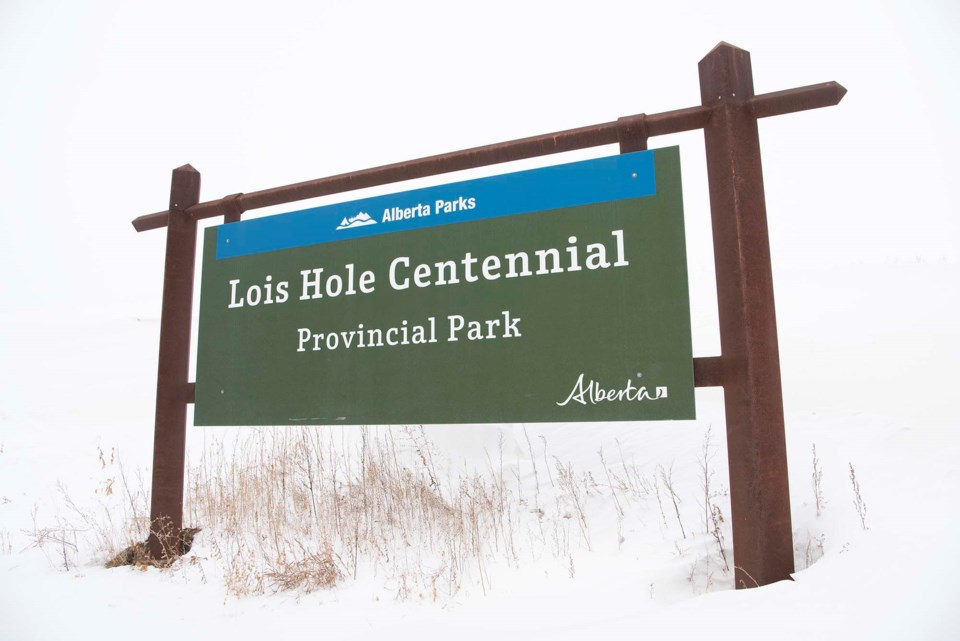A Parkland County councillor wants Big Lake governments to team up and build an interpretive centre in Lois Hole Park.
Parkland County council passed a motion from Division 2 Coun. Kristina Kowalski March 8 to partner with Alberta Environment and Parks, Sturgeon County, City of St. Albert, City of Edmonton, the Big Lake Environment Support Society (BLESS), and the Big Lake Community Association this month to explore plans for an interpretive centre in Lois Hole Centennial Provincial Park.
Officials have been talking about building a nature interpretive centre at Big Lake for decades and in Lois Hole Park in particular ever since it was established in 2005. As part of an expansion to the park in 2010, the province signed a memorandum of understanding with the City of St. Albert and Beaverbrook Development to build an “environmental learning centre” near what is now the John E. Poole interpretive wetland. The 2019 Lois Hole Centennial Provincial Park management plan discusses the centre and flags a potential location for it near the park’s parking lot.
The park does not currently have an interpretive centre, but it does have a garage-like structure groups such as Ducks Unlimited and BLESS sometimes use for interpretive activities.
Let’s get organized, says Kowalski
Kowalski said she and people in her division live next to Big Lake and have a strong interest in protecting it. She decided to start a new push to build the centre when she heard Ducks Unlimited Canada had decided to establish Alberta’s first Wetland Centre of Excellence at Lois Hole Park.
“After the last two years [of pandemic], we’ve learned how much outdoor recreation, walking, exercise, and nature is important to our society,” she said.
“Perhaps now’s the time this initiative could happen with various partners in place.”
Kowalski said Parkland County administration will now reach out to governments and community groups which border Lois Hole Park to see if they can get this centre built. Funding it will be a challenge, as will its location.
“I’d love to see it in Parkland County,” Kowalski said, but she would be fine with having it anywhere around Big Lake, inside or outside Lois Hole Park.
Kowalski said she envisions the centre as fitting into a trail network around Big Lake, and said it might include an outdoor classroom, a viewing platform, possible research facilities, and information on the Indigenous heritage of Big Lake. The centre, which she hopes to see built within three years, would let more people learn about and enjoy nature and could attract more tourists to the region.
BLESS was enthusiastic about Kowalski’s proposal and the idea of more dialogue between regional governments about responsible development around Big Lake, said group vice-president Tony Druett. BLESS is expanding its stewardship activities beyond St. Albert and hopes to see more trails laid along the lake’s south shore.
“Maybe 30 years from now there will be a trail system all around the lake,” Druett said.
While the proposed St. Albert site does seem to be the obvious choice, Druett said it is important for governments not to compete over the centre’s location, but to instead put it in the place best suited for its purpose. He hopes recent interest in the centre will prompt the province to fund it in its next budget.
“It’s not just St. Albert that will benefit from this [facility]. It’s the million people that are in close proximity to it.”
In an email, Alberta Environment and Parks spokesperson Bridget Burgess said that while the 2022 provincial budget did not include cash for the Lois Hole Park interpretive centre, the province is still committed to its 2010 memorandum to build it and welcomed discussions of potential partnerships with area governments and community groups to enhance the park.
In an email, City of St. Albert spokesperson Cory Sinclair said the city would reach out to Parkland County for details on their proposals later this month.




